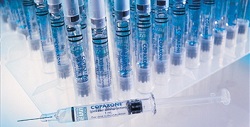 |
It's not just that Teva ($TEVA) doesn't want the FDA to approve generics of its MS star, Copaxone. It really, really, really does not want the FDA to approve them, and it's filed yet another citizen's petition to the agency with a crop of reasons why it shouldn't.
In the new petition--which asks that regulators "consider new scientific information and refrain from approving any abbreviated new drug application referencing Copaxone until certain conditions are met"--the Israeli company takes issue with gene-expression studies done by generics-maker Synthon, which recently won approval for its version in Argentina. Teva argues that its own Copaxone studies evaluate the drug's effects across the entire genome--not just portions, as Synthon's do--and are conducted across various animal models as opposed to just one, ISI Group analyst Umer Raffat wrote in a Wednesday note to investors.
Additionally, branded Copaxone downregulates IL18--which affects T-helper cell differentiation--to a "significantly greater extent … than Synthon's generic," Raffat wrote of the petition, and Synthon's product also may raise the odds of flu-like symptoms compared with the brand, Teva insists.
And fighting on another front, Teva also takes issue with abstracts that Copaxone copycat team Momenta ($MNTA) and Novartis ($NVS) recently submitted for the American Academy of Neurology's upcoming 2015 conference. "Given that the methods for determining the equivalence of non-biological complex drugs are an area of ongoing research in the scientific community, what constitutes a 'comprehensive evaluation of equivalence' is currently an unanswered question," the company responded to one.
Teva's protests may come as no surprise considering how much it has riding on Copaxone's success. While the key moneymaker is much better protected today than it once was--the company now has a new-and-improved long-acting version of the drug on the market, and it may be able to switch about 70% to 75% of patients over before generics hit, Raffat figures--copies will take their toll when they land on the scene. He expects that to happen in September 2015, thanks to a recent Supreme Court decision.
The latest consensus "assumes significant erosion despite the switch," he wrote. Total U.S. Copaxone sales will erode by 31% by 2016, and 50% by 2018--or so the predictions go.
Meanwhile, the company is working to lessen its reliance on its lead drug by foraying into the M&A arena, something it didn't do through all of last year while its peers went on buying sprees. Earlier this week, it agreed to buy California's Auspex Pharmaceuticals ($ASPX) for $3.2 billion, a pact it thinks will boost sales by next year.
- read Teva's petition (PDF)
Special Reports: Top 10 Drug Patent Losses of 2014 - Copaxone | Top 10 Generics Makers by 2012 Revenue - Teva - Novartis (Sandoz) - Mylan